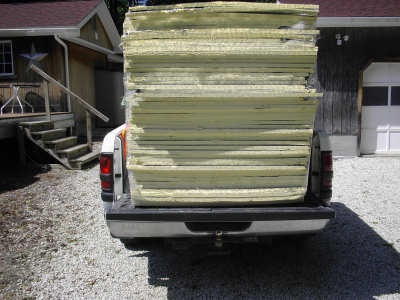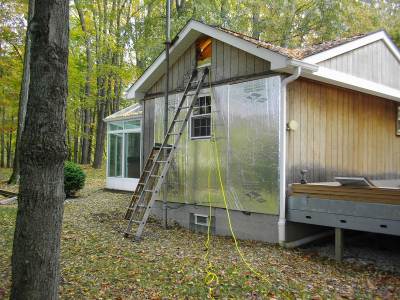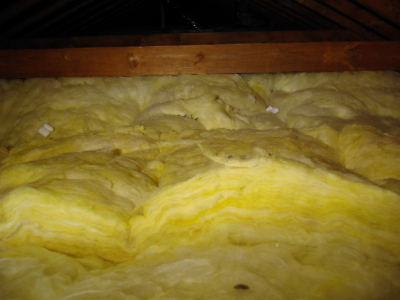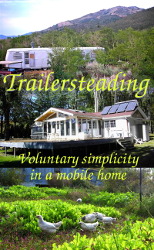
Insulating a mobile home
 Adding
a roof and basement to his mobile home
made it much easier for Zimmy to insulate his house. We've tried
to wrap our minds around insulating our
trailer better, but since
Mark's head already almost brushes the ceiling, we would clearly have
to follow a similar route and we're not quite ready to embark on such a
huge project. Still, it's great to see how a trailer can be
insulated relatively cheaply once you have a roof and basement in place.
Adding
a roof and basement to his mobile home
made it much easier for Zimmy to insulate his house. We've tried
to wrap our minds around insulating our
trailer better, but since
Mark's head already almost brushes the ceiling, we would clearly have
to follow a similar route and we're not quite ready to embark on such a
huge project. Still, it's great to see how a trailer can be
insulated relatively cheaply once you have a roof and basement in place.
Zimmy didn't give me
figures on how
much it cost to build his new roof and basement, but he did say that
the
subsequent insulation job cost about $500. He managed to insulate
so cheaply because he spent some time
scrounging for materials:

With his supplies
compiled, Zimmy and his wife ripped off the inside
paneling and installed 6 mil plastic as a vapor barrier, putting
drywall over that. They tacked an additional two inches of
insulated foam board to the outside of the trailer and coated it with
1/2" of plywood. The resulting combination of insulation in the
walls
now reached R26.

"The roof already had
R19 of fiberglass insulation in it and the
company I worked for sold me at cost bags of rock wool insulation,"
Zimmy wrote. It was simple to add more insulation under the roof,
bringing the insulative value up to at least R60.
Zimmy made sure that I
knew he still planned to put vinyl siding over
the outside walls of the mobile home. I could tell that the
insulating project had been a lot of work, but I'll bet he and his wife
consider that $500 a very wise investment.
| This post is part of our Energy Efficient Mobile Home lunchtime
series.
Read all of the entries: |

Edited to add:
Learn more about insulating and improving the efficiency of a mobile
home in Trailersteading. Now available for
$1.99 on Amazon.
Want more in-depth information? Browse through our books.
Or explore more posts by date or by subject.
About us: Anna Hess and Mark Hamilton spent over a decade living self-sufficiently in the mountains of Virginia before moving north to start over from scratch in the foothills of Ohio. They've experimented with permaculture, no-till gardening, trailersteading, home-based microbusinesses and much more, writing about their adventures in both blogs and books.
Want to be notified when new comments are posted on this page? Click on the RSS button after you add a comment to subscribe to the comment feed, or simply check the box beside "email replies to me" while writing your comment.

This is a super recycling project since they took something existing and turned it into something better that will save energy.
Insulation value is important but it is just as important to seal all the edges tightly too. Otherwise you will not get the full R value. Cold air can blow through insulation and wet insulation has a greatly reduced R value. Don't forget to seal ductwork too if it isn't in the conditioned space.
You can also get a tax credit for 30% of the cost of insulation added to your home through the end of the year.